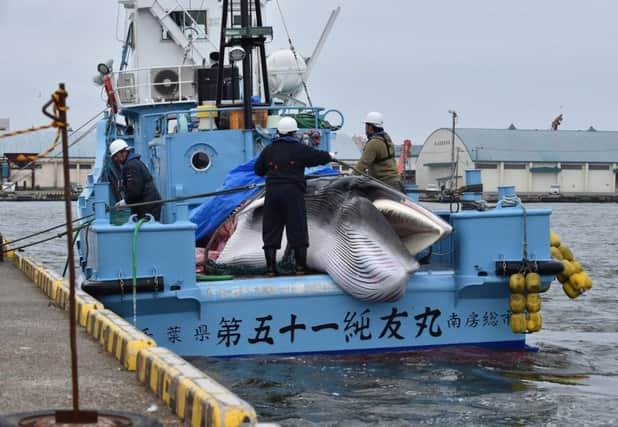Japan resumes commercial whaling after 31-year hiatus


Japan’s six-month notice to withdraw from the International Whaling Commission (IWC) took effect on Sunday, and yesterday whaling boats embarked on their first commercial hunts since 1988, when Japan switched to so-called research whaling.
As the boats left port, whalers, their families and local officials in two major whaling towns, Shimonoseki in south-western Japan, which is prime minister Shinzo Abe’s electoral constituency, and Kushiro in the north, celebrated the fresh start, hoping for a safe return and a good harvest.
Advertisement
Hide AdAdvertisement
Hide Ad“We hope commercial whaling will be on track as soon as possible, contribute to local prosperity and carry on Japan’s rich whale culture to the next generation,” deputy chief cabinet secretary Yasutoshi Nishimura told reporters in Tokyo.
The mother boat Nisshin-maru and two support boats will travel as far as the 200 nautical mile limit to catch minke, Bryde’s and sei whales. Five other smaller ships will stay closer to the coast but also hunt minkes, in addition to Baird’s beaked whales and dolphins that they used to catch under an IWC loophole.
Whales caught in coastal waters are expected to be brought back for fresh local consumption at any of six local whaling hubs that are mainly in northern Japan but include Taiji, a town also known for dolphin hunts because of the documentary film The Cove.
Whale meat caught further off the coast will be frozen and distributed for wider consumption.
The Fisheries Agency said the catch quota of 227 whales is fewer than the 333 that Japan hunted in the Antarctic in recent years.
Under the “research hunts”, which were criticised as a cover for commercial hunts as the meat was sold on the market, Japan at its peak caught as many as 1,200 whales.
The research whaling programme lost money for years – 1.6 billion yen (£11.8 million) in the last year alone.
While the resumption of commercial whaling is condemned by many conservation groups, others see it as a face-saving way to let the government’s embattled and expensive whaling programme gradually succumb to changing times and tastes.
Advertisement
Hide AdAdvertisement
Hide AdDespite the massive attention and political support from ruling party politicians, whaling in Japan involved only a few hundred people and accounted for less than 0.1 per cent of total meat consumption in 2017.
Hideki Moronuki, a Fisheries Agency official and a chief negotiator at the IWC, said the fate of commercial whaling depends on whether whale meat is widely accepted by consumers since it will not be getting as much subsidy as it used to get.
“The future of commercial whaling depends on how popular whale meat can be,” he said.
“Whale meat is a traditional food in Japan and I would like many people to try and develop taste for it, especially younger people.”
Ultimately, the resumption of the traditional whaling may end up saving both huge government subsidies and the lives of many whales, experts say.
“What we are seeing is the beginning of the end of Japanese whaling,” said Patrick Ramage, director of the International Fund for Animal Welfare. “It is a win-win solution that results in a better situation for whales, a better situation for Japan, a better situation for international marine conservation efforts and is therefore to be welcomed.”
The quota for this season’s catch, planned for release in late June, was withheld until yesterday apparently to avoid criticism during the Group of 20 summit that concluded over the weekend in Osaka.